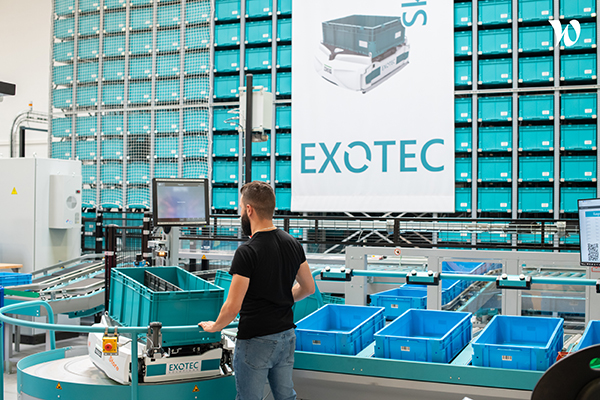3PLs in the UK are harnessing the power of robotics technology to overcome pressing challenges.
By Simon Jones, Senior Sales Executive at Exotec
The increasing availability of sophisticated, space-saving, and hyper-productive automation technologies based on robotics is reshaping the entire landscape of logistics, and specifically fulfilment. This is forcing the UK’s third-party logistics companies (3PLs) to confront and adapt to unprecedented change.
Traditionally operating in a low-margin business, 3PLs have often traded higher potential profits for lower risk and stability afforded by open-book contracts, yielding low single-digit management charges. Recent economic uncertainties and the rapid rise in inflation suggests this has been a sensible strategy for 3PLs. However, it has left many of their customers with significantly increased costs. These customers are now likely to intensify their search for viable ways to offset these increases.
This is compounded by many other challenges currently facing 3PLs in the UK, including the labour shortage, Brexit, and the increasing cost of warehouse space. The result is that we are at an inflection point for the sector. 3PLs must find more effective and extensive ways to exploit automation to significantly reduce the cost of labour and warehouse space for their customers. If they don’t, a competitor is likely to entice their customer away, or worse, their customer might make the investment themselves and take the operation back in house.
Robotic-based ASRSs are transforming the industry. Even just 10 years ago, if a company fulfilling high volumes of ecommerce or store replenishment orders wanted to automate, it required some very long-term planning and huge financial commitments.
The only option was to install large, often custom-built, fixed systems. As these systems tended to be very inflexible, fluctuations in throughput, storage volumes or even order profiles could be very hard to accommodate. This meant systems were often oversized to accommodate possible growth over the following decade or so, which inevitably means they initially cost much more to buy and maintain.
Worse, there is never any guarantee that a business will grow in the way expected. So very often, the result is automation that is operating outside its comfort zone at sub-optimal performance. In view of all these challenges, it was inconceivable for a 3PL to make this investment, so this kind of automation has always been paid for and owned by the 3PL’s customers.
The situation is now very different. The more sophisticated robotic-based systems can now handle high volumes of throughput and storage, whilst increasing storage density and reducing the floorspace required. They are also relatively quick to deploy and very easy to expand later when required by the business. These solutions tend to be more reliable as some systems have no single point of failure and they are built up from standard, easy-to-replace components.
These interchangeable components, in particular the robots, can be moved from site to site to maximise utilisation and exploit scale. However, many 3PLs have been quite slow to adopt these technologies in the UK due to a number of obstacles.

There are a number of different contract types for 3PLs in the UK, and some of them create an obstacle for 3PLs looking to adopt automation.
While open-book contracts have served 3PLs and their customers well over the last few decades, the 3PL usually makes most of its revenues by adding a small management charge percentage on top of all the costs they incur running the operation, before passing the bill to their customer. One of the biggest costs of a manual fulfilment operation is the labour force. If automation is deployed in a warehouse that reduces the labour requirement by 80%, the revenue and profit generated by the 3PL drops by a similar amount.
Similarly, short-term contracts, often for two to five years, are much too short for a 3PL to get a return on the scale of investment needed to reduce the labour required by 80%+ and minimise the warehouse space used. Ownership of the space where the fulfilment operation will be can also have an impact, as if it is owned by the customer, the 3PL will only be able to offer low impact, easily relocatable automation as part of the contract.
Progressive 3PLs in the UK are reinventing themselves and overcoming these challenges in creative ways to provide value to customers and their own business.
Longer contracts are being favoured over shorter contracts. In the US and other countries, closed-book contracts are much more common than open-book ones, and this could be a major reason why 3PLs overseas are often prepared to make significant investments in large scale automation themselves. We are seeing more interest in closed book contracts in the UK, and by combining the use of inflation indices, longer contract terms and closed-book contracts, the 3PL can offer their customers lower unit costs without exposing itself to unnecessary risk.
3PLs are in a unique position to advise their customers on the most effective automation solutions for their operations. Unfortunately, while many 3PLs have unrivalled warehouse design experience in house, fewer 3PLs have real breadth and depth of knowledge of the technicalities of robotic ASRS systems and their design.
Collaboration is becoming a key element in the future of logistics. 3PL companies are forging partnerships with automation technology providers and industry experts to stay at the forefront of innovation. This collaboration will foster knowledge-sharing and ensure that 3PL providers are equipped with the latest technologies and industry best practices.
When the 3PL owns the warehouse and automation, the natural development is the creation of multi-tenant sites. This could be one of the most exciting developments of this reinvention of the sector. By housing several customers in one large, fully automated site, the 3PL will be able to provide exceptional value for money to their customers, as well as de-risking the operation and investment for themselves. First mover advantage will provide such a competitive advantage that most of the market will have to follow suit very quickly. It is very possible that all but the very largest customers will be served in this way in the near future, which would be a win-win for customer and 3PL alike.
The UK’s third-party logistics (3PLs) sector stands at a pivotal juncture. The relentless march of technology and economic pressures necessitates an urgent re-evaluation of existing practices. The adoption of robotic systems and innovative contract structures are not just options but imperatives for survival. As traditional models are challenged, bold, creative adaptation will define the success and sustainability of 3PLs in this new era of automation and efficiency.

Simon Jones is Exotec’s Senior Sales Executive for the UK and Ireland. For the last 18 years, Jones has helped companies introduce new technology to their supply chain and logistics operations to improve productivity and customer service. Prior to Exotec he has worked with companies such as Honeywell and Vocollect, as well as robotics solutions provider 6 River Systems. This has given him a unique understanding of the challenges faced in retail, e-commerce and warehousing, together with practical experience of how to use disruptive technology to solve these challenges.
In this episode, I sat down with Beejan Giga, Director | Partner and Caleb Emerson, Senior Results Manager at Carpedia International. We discussed the insights behind their recent Industry Today article, “Thinking Three Moves Ahead” and together we explored how manufacturers can plan more strategically, align with their suppliers, and build the operational discipline needed to support intentional, sustainable growth. It was a conversation packed with practical perspectives on navigating a fast-changing industry landscape.